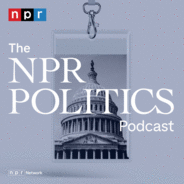Donald Trump's legal team and the Justice Department disagree over who should review the documents, what that review should entail and who should foot the bill. The saga is far from over.This episode: political correspondent Susan Davis, political reporter Deepa Shivaram, and national political correspondent Mara Liasson.Learn more about upcoming live shows of The NPR Politics Podcast at nprpresents.org.Support the show and unlock sponsor-free listening with a subscription to The NPR Politics Podcast Plus. Learn more at plus.npr.org/politics Connect:Email the show at nprpolitics@npr.orgJoin the NPR Politics Podcast Facebook Group.Subscribe to the NPR Politics Newsletter.Learn more about sponsor message choices: podcastchoices.com/adchoicesNPR Privacy Policy

Politik
The NPR Politics Podcast Folgen
Every weekday, NPR's best political reporters are there to explain the big news coming out of Washington and the campaign trail. They don't just tell you what happened. They tell you why it matters. Every afternoon.Political wonks - get wonkier with The NPR Politics Podcast+. Your subscription supports the podcast and unlocks a sponsor-free feed. Learn more at plus.npr.org/politics
Folgen von The NPR Politics Podcast
1750 Folgen
-
Folge vom 12.09.2022Fight Over Trump's Confidential Docs Remains Ugly And Tedious
-
Folge vom 09.09.2022Congress Will Vote On Same-Sex, Interracial Marriage RightsWith their base energized after the Supreme Court struck down national abortion access protections, Democrats are pushing to vote on a marriage bill ahead of midterm elections. And in Colorado, can this Republican Senate candidate — who recognizes Joe Biden's election win and believes in limited access to abortion — unseat a Democratic incumbent?This episode: White House correspondent Tamara Keith, political correspondent Susan Davis, and congressional correspondent Deirdre Walsh.Learn more about upcoming live shows of The NPR Politics Podcast at nprpresents.org.Support the show and unlock sponsor-free listening with a subscription to The NPR Politics Podcast Plus. Learn more at plus.npr.org/politics Connect:Email the show at nprpolitics@npr.orgJoin the NPR Politics Podcast Facebook Group.Subscribe to the NPR Politics Newsletter.Learn more about sponsor message choices: podcastchoices.com/adchoicesNPR Privacy Policy
-
Folge vom 08.09.2022Pandemic, Polarization, Prosecution: New Ballot Box PoliticsVeterans' groups, students and attorneys are mobilizing to work at polling sites as health and political concerns have strained staffing in localities across the country. And a voter fraud crackdown in Florida has exposed the complicated state of voting rights in the state.This episode: White House correspondent Tamara Keith, voting correspondent Hansi Lo Wang, and politics reporter Ashley Lopez.Learn more about upcoming live shows of The NPR Politics Podcast at nprpresents.org.Support the show and unlock sponsor-free listening with a subscription to The NPR Politics Podcast Plus. Learn more at plus.npr.org/politics Connect:Email the show at nprpolitics@npr.orgJoin the NPR Politics Podcast Facebook Group.Subscribe to the NPR Politics Newsletter.Learn more about sponsor message choices: podcastchoices.com/adchoicesNPR Privacy Policy
-
Folge vom 07.09.2022Donald Trump's Republican Doubters Warn Of "Lame Duck" LimitsDonald Trump's GOP critics have begun to suggest that Republicans should nominate a fresh face, someone eligible for reelection after 2024. It's the kind of pragmatist argument that doesn't usually sway voters — but it does hint that party strategists are worried that Trump's poor standing with independent voters would against cost them the presidency.This episode: political correspondent Susan Davis, senior political editor and correspondent Domenico Montanaro, and national political correspondent Mara Liasson.Learn more about upcoming live shows of The NPR Politics Podcast at nprpresents.org.Support the show and unlock sponsor-free listening with a subscription to The NPR Politics Podcast Plus. Learn more at plus.npr.org/politics Learn more about sponsor message choices: podcastchoices.com/adchoicesNPR Privacy Policy
